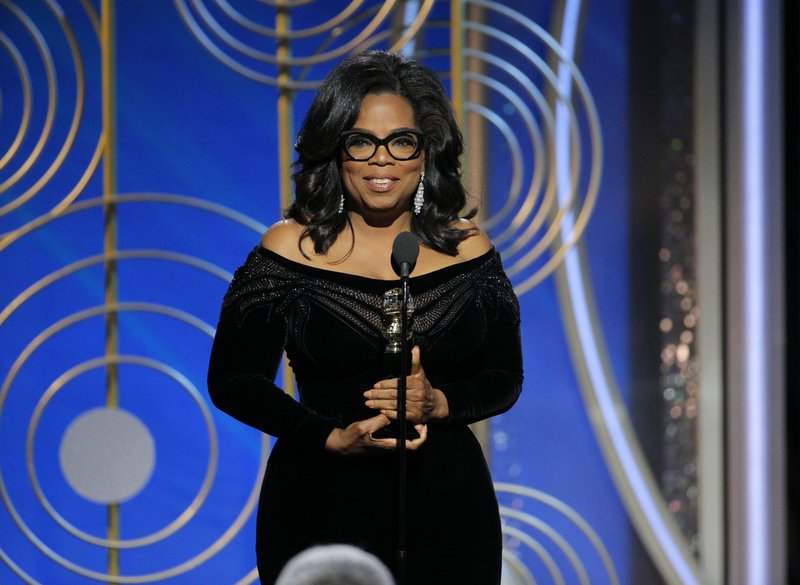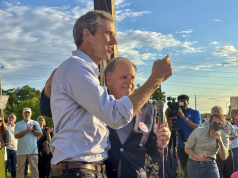By Kristin M. Hall
Associated Press

Oprah Winfrey earned multiple standing ovations at Sunday’s Golden Globes as she accepted the Cecil B. DeMille Award with a moving speech referencing civil rights and the #MeToo movement, declaring that the reign of abusive men was coming to an end: “Their time is up!”
The OWN founder, former talk show host, actress, film and TV producer and humanitarian became the first black woman to be given the award, which was presented in Beverly Hills, California. She spoke about the feelings she had as a young girl watching Sidney Poitier win the best-actor Oscar in 1964 and likened the pride she felt watching Poitier, the first black man to win that trophy, to the impact she hoped she could have on young women today.
“His tie was white and of course his skin was black and I had never seen a black man being celebrated like that,” Winfrey said.
As her longtime partner Stedman Graham watched from the audience, she told the story of a black woman from Alabama named Recy Taylor, who died at the age of 97 on Dec. 28, 2017, and her fight for justice after her rape by six white men in 1944.
She expressed gratitude for Taylor and all the women who were silenced when they spoke out about powerful men, the women who worked in factories, farms, as domestic workers and in academia, whose names will never be known.
“For too long, women have not been heard or believed if they dared to speak their truth to the power of those men,” Winfrey said.
“But their time is up! Their time is up! Their time is up!” she shouted to a standing ovation. The phrase also referenced the “Time’s Up” initiative led by women in Hollywood and others to combat sexual misconduct; that was at the center of the message actresses sent by wearing mainly black at the Globes on Sunday night.
Winfrey said while there was no justice for Taylor, whose attackers were never prosecuted, her truth lived on in the work of civil rights icon Rosa Parks, an ACLU investigator on Taylor’s case.
“It was somewhere in Rosa Parks’ heart almost 11 years later when she made the decision to stay seated on that bus in Montgomery,” Winfrey said. “And it’s here with every woman who chooses to say, ‘Me too’ and every man, every man who chooses to listen.”
Winfrey, who got her start in television journalism, also thanked the Hollywood Foreign Press Association, which gives out the Golden Globes.
“We all know that the press is under siege these days, but we also know that it is the insatiable dedication to uncovering the absolute truth that keeps us from turning a blind eye to corruption and to injustice, to tyrants and victims and secrets and lies,” Winfrey said.
She ended on a hopeful note saying “a new day was on the horizon” because of people, some of whom were in the Golden Globes audience, who will “take us to the time when nobody ever has to say ‘me too’ again.”
On Twitter the celebrity reaction was swift and in full support:
“Oprah cometh,” tweeted actress Amber Tamblyn, while musician Pharrell Williams called her the greatest of all time.
“Let me tell you this room is still vibrating like electricity from that speech,” Ava DuVernay tweeted.
While most of the talk was about progress in the sphere of gender, actor Sterling K. Brown of TV’s “This Is Us” addressed progress of a different kind: he was the first black actor to win the Globe for best actor in a TV drama. He thanked the show’s creator, Dan Fogelman, for writing a role “for a black man that can only be played by a black man.” What he was grateful for, Brown said, is that “I’m being seen for who I am and being appreciated for who I am, and it makes it that much more difficult to dismiss me or dismiss anybody who looks like me.”





